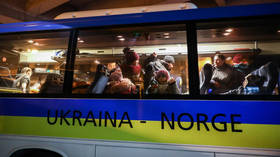EU nation to scrap free accommodation for Ukrainian refugees
Irish Prime Minister Leo Varadkar cited his nation’s housing crisis, but has said Ukrainians will still be welcome
Irish Prime Minister Leo Varadkar has announced his government intends to make Ukrainian refugees pay for their accommodation in the country. He noted that Ireland has so far been among the most generous EU member states in this respect, but cannot afford it anymore due to a housing crisis.
Speaking to reporters during an official visit to South Korea over the weekend, Varadkar explained that the “numbers have been very large. It’s putting huge pressure on accommodation.”
The new policy, which the prime minister hopes to introduce before the end of the year, is meant to decrease the flow of newcomers, so that Irish authorities have “more time to catch up on” housing and other issues.
Varadkar also pointed out that other EU member states “don’t offer, for example, unlimited state-provided accommodation at no cost,” explaining that he would like to bring conditions in line with those in other Western European nations.
He said approximately 30% of the 500 to 800 Ukrainians arriving each week in Ireland had claimed temporary protection in another European state before moving on to the island nation.
The prime minister stressed, however, that “Ukrainians will still be welcome here.”
On top of ending free accommodation, the Irish government is also planning to change social welfare benefits to encourage Ukrainian refugees to seek jobs. The details have yet to be finalized.
Meanwhile, Germany’s Der Spiegel reported on Saturday that Berlin’s efforts to integrate Ukrainians into the local labor market appear to be failing. The outlet quoted several regional officials as saying that new legislation introduced by the government may actually discourage newcomers from seeking a job.
Under the new rules, Ukrainian refugees now receive €502 ($540) a month in ‘citizens’ benefits’ (Buergergeld) as opposed to a payout of €410 per month they were entitled to previously. On top of that, they are now being provided with an apartment instead of shared accommodation.
Mattias Jendricke, a district administrator in Nordhausen, Thuringia, told Der Spiegel that the government has “made it too nice for them.” While another official noted that the “willingness of refugees from Ukraine to work has decreased significantly with the switch to citizens’ benefits.”
According to the head of the Federal Employment Agency, Andrea Nahles, the employment rate of Ukrainian refugees stands at 19%.
Meanwhile, as of late September, their number in Germany exceeded one million, as estimated by Mediendienst Integration information service.
You can share this story on social media:








Comments are closed.